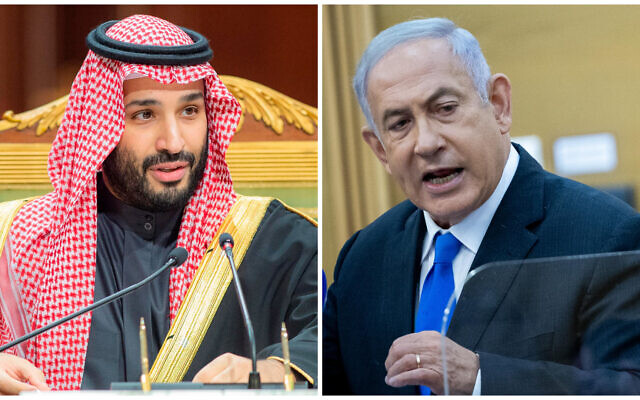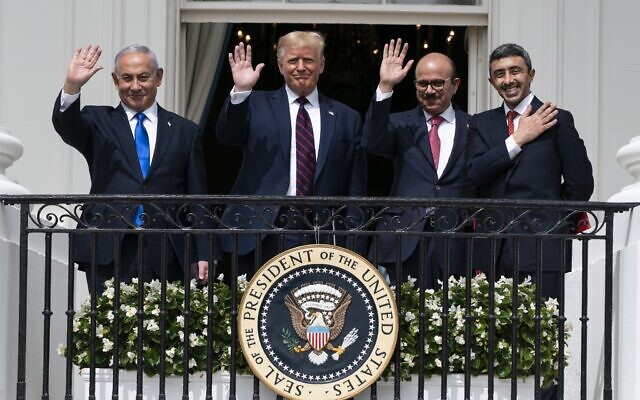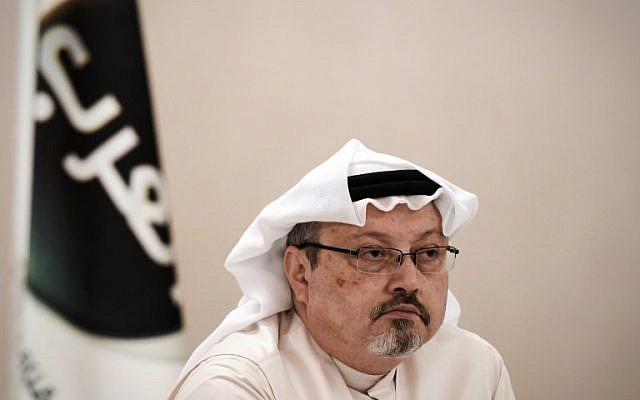NYT: With Pegasus permit stalled after Khashoggi murder, MBS phoned then-PM to sort matter, in return for opening airspace to Israel flights; FBI also bought Pegasus, didn’t use it

Saudi Arabia’s Crown Prince Mohammed bin Salman directly phoned then-prime minister Benjamin Netanyahu to get a renewal of the kingdom’s expired license for NSO Group’s controversial Pegasus spyware, in exchange for opening up its airspace for Israeli flights, The New York Times reported Friday.
According to the report, after Riyadh’s license for the software expired, the Israeli Defense Ministry declined to renew it, citing Saudi Arabia’s abuse of NSO’s spyware, apparently referring to the case of Jamal Khashoggi, a Saudi journalist who was reportedly tracked with Pegasus in the lead up to his murder in 2018.
Without the export license, NSO was unable to provide Saudi Arabia with routine maintenance on the software, and its systems were crashing. Numerous calls among the crown prince’s aides, NSO executives, the Mossad and the Israeli Defense Ministry had failed to resolve the issue, the newspaper said.
The crown prince then placed an urgent direct telephone call to Netanyahu, asking for the license to be renewed, sources familiar with the call told the newspaper.
The call came prior to the announcement of the Abraham Accords, a series of normalization agreements in 2020 between Israel and the Gulf states of the United Arab Emirates and Bahrain. (Later Morocco and Sudan joined the accords.)
A critical part of the agreements was allowing the use of Saudi airspace, for the first time ever, by commercial Israeli planes flying eastward on their way to the Gulf.

Netanyahu, unaware of the license crisis until his conversation with the crown prince, immediately ordered the Defense Ministry to have the problem fixed, the report said.
A ministry official called NSO’s operations room that same night and asked to have the Saudi systems switched back on. But the company’s compliance officer on duty rebuffed the request and demanded a signed license, according to The New York Times.
The official reportedly told the employee that the orders came directly from Netanyahu. He then agreed to accept an email from the ministry, and shortly thereafter, Pegasus spyware was once again up and running in Saudi Arabia.
The next morning, a Defense Ministry courier delivered a stamped and sealed permit to NSO’s headquarters, according to the report.

The initial sale of Pegasus to the kingdom, under the supervision of Prince Mohammed, was made in 2017 for an installation fee of $55 million, the report said.
Only a small group of senior defense officials, reporting directly to Netanyahu, took part in the exchanges with the Saudis, all “while taking extreme measures of secrecy,” one of the Israelis involved in the affair told the newspaper.
“Keeping the Saudis happy was important for Netanyahu, who was in the middle of a secret diplomatic initiative he believed would cement his legacy as a statesman — an official rapprochement between Israel and several Arab states,” the report said.

In a statement released by Netanyahu’s office on Friday, the former premier denied the report.
“The claim that [then-]prime minister Netanyahu spoke to foreign leaders and offered them these systems in exchange for a political achievement or some other achievement is a complete lie,” the statement read.
“All sales of this system or similar products from Israeli companies to foreign countries are made with the approval and supervision of the Defense Ministry, as required by Israeli law,” Netanyahu’s office said.
NSO says it sells Pegasus only to governments for the purpose of fighting crime and terrorism. All sales require approval from the Defense Ministry. While it says it has safeguards in place to prevent abuse, NSO says it has no control over how a client uses the product and no access to the data they collect. It says it has terminated several contracts due to the inappropriate use of Pegasus.
The company has been involved in numerous scandals in recent years and has faced a torrent of international criticism over allegations it helps governments, including dictatorships and authoritarian regimes, spy on dissidents and rights activists.
In recent weeks, the Israeli business daily Calcalist has published a series of reports alleging that Israeli police used Pegasus without proper approvals to keep tabs on Israeli targets, including political protesters. Police have denied abusing the product, but Israel’s attorney general has opened an investigation into the matter.
In November, the US Department of Commerce blacklisted NSO Group, adding it to the list of foreign companies that engage in malicious cyber activities.
The New York Times additionally reported that Pegasus spyware had been bought by the FBI, and that a team from NSO had traveled to the US to set it up.
However, the report said after extensive testing, the American security agency ultimately decided against the deployment of the spyware.
An FBI spokesperson told the newspaper that they often examine the possibility of using new technologies “not just to explore a potential legal use but also to combat crime and to protect both the American people and our civil liberties. That means we routinely identify, evaluate and test technical solutions and services for a variety of reasons, including possible operational and security concerns they might pose in the wrong hands.”
As reported by The Times of Israel
